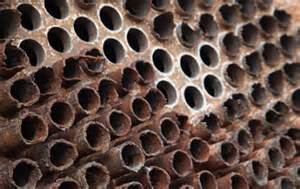Thermodyne Engineering Systems
What is Corrosion ,Causes of Boiler Corrosion and Prevention of Corrosion
What is Corrosion?
Corrosion is the natural process of metal deterioration due to chemical reactions with elements like moisture and oxygen. It can cause structural weakening and safety hazards in industries like construction and transportation. To combat corrosion, protective coatings, regular maintenance, and corrosion-resistant materials are employed to extend the lifespan of metal components and structures.
There are several types of corrosion, including:
- Uniform Corrosion: This is a general and even corrosion that affects the entire surface of a metal, leading to a gradual loss of material thickness.
- Galvanic Corrosion: Occurs when two dissimilar metals are in contact in the presence of an electrolyte, resulting in the more reactive metal corroding more rapidly.
- Pitting Corrosion: Characterized by localized holes or pits on the metal’s surface, caused by aggressive chemical environments or localized breakdown of protective layers.
- Crevice Corrosion: Occurs in confined spaces or crevices on the metal surface, where the lack of oxygen and accumulation of corrosive agents accelerates corrosion.
- Intergranular Corrosion: Affects the grain boundaries of metals, often due to impurities or sensitization during welding processes.
- Stress Corrosion Cracking (SCC): Caused by the combined effects of tensile stress and a corrosive environment, leading to cracking and failure of the metal.
Corrosion can have a significant impact on the performance and lifespan of metals. It can also be a safety hazard, as corroded metals can become brittle and fail.
There are a number of ways to prevent corrosion, including:
- Using corrosion-resistant materials: Some metals, such as stainless steel, are more resistant to corrosion than others.
- Applying protective coatings: Protective coatings, such as paint or galvanizing, can help to prevent corrosion.
- Using cathodic protection: Cathodic protection involves applying an electric current to the metal, which helps to prevent corrosion.
What is Boiler Corrosion?
Boiler corrosion is the deterioration of a boiler’s metal surfaces due to chemical reactions with its environment. It is a major problem that can lead to catastrophic failure of the boiler if not properly prevented and controlled.
The main cause of boiler corrosion is the presence of oxygen in the boiler water. Oxygen can enter the boiler water through leaks in the boiler, through the feedwater system, or through the air when the boiler is opened for maintenance. Once oxygen is present in the boiler water, it can react with the metal of the boiler to form rust.
Boiler corrosion refers to the process of deterioration and damage that occurs to the metal components of a boiler system due to chemical reactions, typically involving water, oxygen, and the materials of the boiler itself. Corrosion can compromise the integrity of the boiler, leading to reduced efficiency, increased maintenance costs, and even safety hazards if left unchecked.
To prevent boiler corrosion, various measures can be taken:
-Water Treatment: Proper water treatment involves removing impurities and adjusting the chemical composition of the water to reduce its corrosive potential.
-pH Control: Maintaining the proper pH level of the water helps prevent acidic or alkaline conditions that can contribute to corrosion.
– Oxygen Removal: Minimizing the presence of dissolved oxygen in the water helps prevent oxidative corrosion.
– Cathodic Protection: Installing sacrificial anodes or using impressed current systems can protect the boiler by sacrificing a less noble metal to prevent corrosion of the more valuable components.
– Coatings and Linings: Applying protective coatings or linings to the internal surfaces of the boiler can create a barrier between the metal and corrosive agents.
Regular inspection, maintenance, and adherence to industry standards are crucial to ensuring the long-term performance and safety of boiler systems by effectively managing the risk of corrosion.
“Boiler Corrosion is a slow poison for Industrial Boilers. Talk to Experts and save your boilers life: Thermodyne Team“
Corrosion is a phenomenon in which atmospheric oxygen in the air or water reacts with the metal to form “oxides. Corrosion in industrial boilers is a phenomenon in which the oxygen that is dissolved in the water inside the boiler reacts with the metal of the steam boilers.
The ferrous component of the metal reacts with the atmospheric oxygen in the water to undergo oxidation. This oxidation results in the formation of ferrous oxides. Ferrous oxides lead to the formation of cavities and holes in the metal.
This gradual formation of cavities and holes in the metal is termed pitting. Pitting is the main host for the corrosion which ultimately destructs metal and its properties.
Causes of Boiler Corrosion
- Improper and unscheduled maintenance.
- Exposure of boiler metal to dissolved gases present in boiler water
- Oxygen present in boiler water
- Carbon Dioxide present in boiler water
- Unbalanced pH of boiler water
- Improper and unscheduled maintenance
- Exposure of metal to the dissolved gases i.e oxygen and carbon dioxide present in boiler feed water
- Unbalanced pH of the water inside the Steam Boiler
- Improper and unscheduled maintenance
- Dissolved Gases In Boiler Water
How to Prevent Boiler Corrosion
Even the most aggressive forms of prevention can’t stop minor corrosion from eventually happening. But, with the right approach, the symptoms of corrosion can be reduced and the life of your boiler extended.
Here are some methods which anyone can follow to reduce the corrosion inside the boiler-
- Treat Water- Additives ensure that all oxygen in the feedwater that reaches the boiler is quickly consumed. These additives prevent oxygen from forming corrosive cells and blisters. Keep on top of the boiler water by working with a reputable water chemistry firm.
- Use of Barrier Coatings: Barrier coatings such as paint, fiber, or powder are one of the simplest and inexpensive methods to resist corrosion. To make a thin film, powders such as epoxy, nylon, and urethane are heated to the metal surface. Metal surfaces are sometimes coated with plastic and wax. Paint serves as a barrier, protecting the metal surface from corrosive compounds’ electrochemical charge.
- Alkalinity to control pH
- Cathodic Protection: This method is used when two different metals are put together and exposed to a corrosive electrolyte. To prevent this, the active sites on the metal surface must be transferred to passive sites by supplying electrons from a different source, usually, galvanic anodes connected to or close to the surface.
Reason Of Boiler Corrosion
Boiler corrosion is the degradation of a boiler’s metal components due to chemical reactions with water, steam, or other substances. It can lead to serious problems, such as leaks, explosions, and equipment failure.
There are many factors that can contribute to boiler corrosion, including:
- The composition of the water used in the boiler. Hard water, which contains high levels of minerals, is more corrosive than soft water.
- The temperature of the water. The higher the temperature, the more corrosive the water becomes.
- The presence of oxygen in the water. Oxygen can react with the metal in the boiler to form rust.
- The presence of other chemicals in the water. Some chemicals, such as chlorides and sulfates, can also be corrosive.
- The design of the boiler. Poorly designed boilers can be more susceptible to corrosion.
Boiler Resources Page Links
- Boiler Losses That Eat Away Your Profits
- Dissolved Gases in Feed Water and Its Effect
- Pressure Reduction System
- How to Minimize the Blowdown Losses
Boiler corrosion is the deterioration of a boiler’s metal surfaces due to chemical reactions with its environment.
The most common causes of boiler corrosion are:
Oxygen
Carbon dioxide
Contaminants
High temperatures
Stress
Boiler corrosion can cause a number of problems, including:
Reduced efficiency
Increased maintenance costs
Safety hazards
There are a number of ways to prevent boiler corrosion, including:
Using corrosion-resistant materials
Treating the boiler water
Monitoring the boiler
The signs of boiler corrosion include:
Rust
Pitting
Holes
Leaks
Boiler corrosion can be fixed by:
Repairing the damaged areas
Replacing the affected parts
Treating the boiler water
The cost of fixing boiler corrosion depends on the severity of the damage. In general, it is less expensive to repair minor damage than it is to replace major parts.
The best way to prevent boiler corrosion from happening again is to take steps to prevent it in the first place. This includes using corrosion-resistant materials, treating the boiler water, and monitoring the boiler.
Boiler corrosion can weaken the boiler, which can lead to safety hazards. These hazards include:
Boiler explosions
Boiler fires
Boiler leaks
In some jurisdictions, there are legal requirements for boiler corrosion. These requirements may include:
Regular inspections by a qualified inspector
Repair or replacement of damaged parts
Treatment of the boiler water
Corrosion is the gradual destruction of a material, usually a metal, by chemical or electrochemical reaction with its environment. It is a natural process that can be accelerated by factors such as moisture, oxygen, acids, and salts.
[:]

